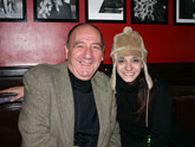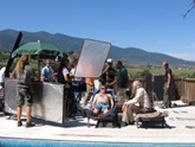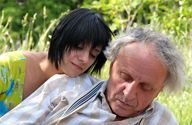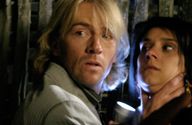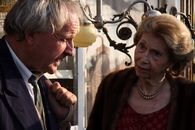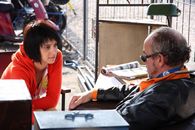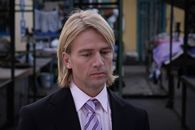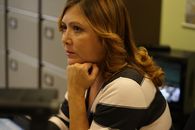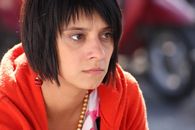Directors Notes "PRIMA PRIMAVERA"

JANOS EDELENYI
Strange as it may sound to anyone who is already familiar with the story line, Prima Primavera is essentially an autobiographical film. And its main
character, the fifty-something, slightly retarded Gábor Kertész, is really me – and not only in the Flaubertian sense of an author identifying with his hero. We share the same sensibility, capacity or even need for emotional response, the same abhorrence of brutality and violence. And above all, we refuse to accept that our dead are lost to us forever. We both stubbornly cling to the notion that we will see them again soon, and – cheating death – even in the mean time, we maintain daily contact with them, offering
and receiving advice and support. “Prima Primavera!”: this was my father’s catchphrase from my childhood, but I still use it to express a state of very deep satisfaction…
But I also feel very close to the film’s female lead Jolie. Cast out by her mother and raised in a children’s home, she has drifted from prostitution into crime. She nurtures a superstitious terror of being trapped by her destiny – as she reprimands her aged mentor: “You’re wrong, uncle Feri. I didn’t go astray, I was born astray.” This helps to put the main, underlying (but
never uttered) question of the film: is there hope for those who were born on the wrong side of the tracks? And it is mainly through Jolie’s lovable character, through her trials and tribulations and through her interaction with Gábor that I can answer simply and clearly: Yes, we might all get a second chance. For although life may seem to be governed by blind fate,
this is only true for those who accept it!
Prima Primavera is a road movie, but not only – or even primarily – by virtue of the few hundred kilometres travelled by its protagonists. The inner
journey that they undertake is far more important. The kilometres measured on a map or depicted through changes in the background scenery are
nothing compared to the progress that Gábor and Jolie make towards each other – and their own selves.
The changing landscape, in a sense, is the story itself. It’s the very soul of the film. Gabor’s journey from a stifling apartment, overflowing with the past and with no provisions for the future, where his only escape is the minute observation of microscopic life-forms and inanimate objects, to the open, breathtakingly immense and majestic vistas of the Carpathians, which are used to depict the development of the protagonists’ view and comprehension of the world in and around them.
The style (and technique) of the photography assists in developing the story, and mirrors the inner journey of the lead characters. In the first third of the film Gábor only appears in crowded shots, almost never left alone – or to be more precise: without a chaperone – in the frame. After Mother’s death, the chaotic, incomprehensible and thus threatening outside world
intrudes on the scene. Early on in the film a telephoto lens is often used to “compress” the picture, making the scenes appear cluttered, much as the world appears to Gábor. Figuratively speaking, Gábor is in a prison, a cell constructed from objects and human relationships, from which he is sprung with the help of Jolie, the photography becoming airier and more expansive as his horizons broaden.
The turning point, both in terms of the plot and the style of photography, comes half way through the film, in the “truck park” scene. In reality, this pivotal location is merely an overgrown section of hard shoulder that has been left wider than usual. The whole landscape resembles the set of a neo-realist film that someone forgot to dismantle fifty years ago.
This scene is populated with the nomadic community of lorry drivers, washing or cooking supper on paraffin stoves, but it is the teenage prostitutes, plying their trade in five-minute blow jobs, that unsettle Jolie
the most. In contrast, the other side of the road is bordered by a lush green chain of mountains, their peaks dusted with a tantalisingly pure and virginal
sprinkling of snow, even in sunny June. Rising unexpectedly out of the plain, they almost seem to be within arm’s reach. This is abroad, the promise of a
new life, new opportunity.
When our heroes cross into the promised land it is not only the scenery but the whole style of composition, and even the focal length of the lenses used that change. The wide-angle shots exude breadth and boundlessness. Increasingly, the frame encompasses tracts of blue sky with cotton-wool clouds, and a landscape in harmony, not marred but complemented
by the presence of man. And not only the photographic style, but the
soundtrack also begins to change at this point. The suspenseful, thriller-like music softens, to eventually become almost triumphal in places. Of course,
the sounds and chaotic reverberations of the past occasionally impinge on this photographic and musical reverie, as our heroes find out the hard way that a simple change of address is not enough to start again with a clean sheet - although they will manage it in the end!
Prima Primavera was primarily written with the two lead actors, György Cserhalmi and Vesela Kazakova, in mind. As director, I am doing all I can to help them identify as fully as possible with their roles, a process which (as their enclosed letters also show) began long ago. György Cserhalmi, who has been a close friend of mine for the past forty years, has given me valuable advice that bears witness to a deep understanding of the character he is to play. Vesela’s body language and ability to absorb the mood of the prospective locations like a sponge, are also woven tightly into
the script. And yes – your eyes do not deceive you – the actors do participate in the exciting task of searching for (and finding) locations. Also, by mutual agreement, several weeks of studio rehearsals will help to bring them together, as perfectly as possible, with the characters that they will play. And this applies to all the participating actors, since the players are
not only highly acclaimed artistes and masters of their profession, but they are each part of a single ensemble. It is through them, through their facial
expressions, their body language and emotional reactions, that the whole story of Prima Primavera will be told.
Shortly before his suicide, Attila József, in my opinion the greatest Hungarian poet of all time, wrote the following in a diary of free associations that he kept at the request of his psychoanalyst: “[ my childhood with my adoptive parents] was bad. Why couldn’t I have two little horses, a little woman, a little house, little dog, little pony, little scythe, little wheat field - all proportionate to my own size, just as everything was sized proportionately to my adoptive father..? Is my world proportionate to my own size now???”
Put simply, this is what the film is about: how the world becomes proportionate to our beleaguered heroes, Gábor and Jolie. How it becomes more habitable for them. And this is what makes Prima Primavera an uplifting film. A film where the main characters have an opportunity to start again and – most importantly of all – to have a better life.

